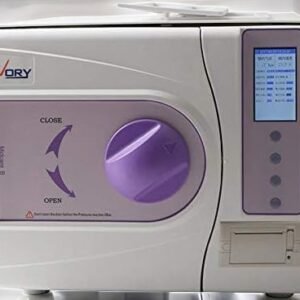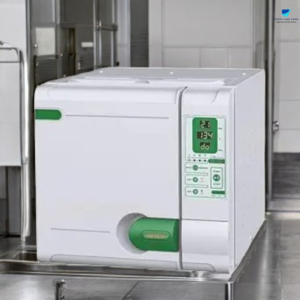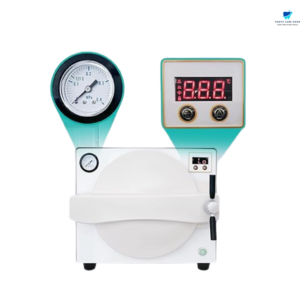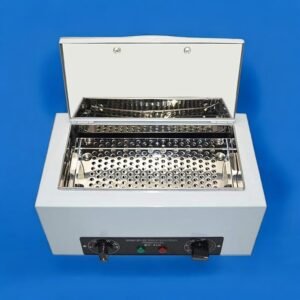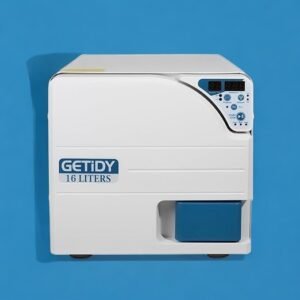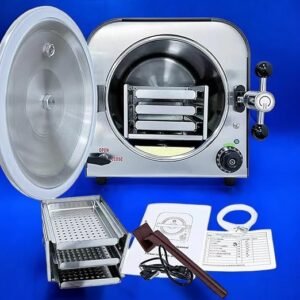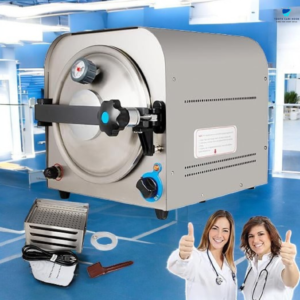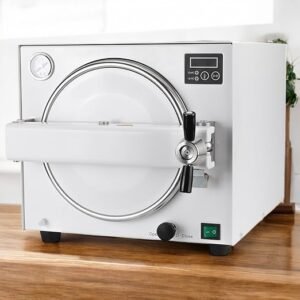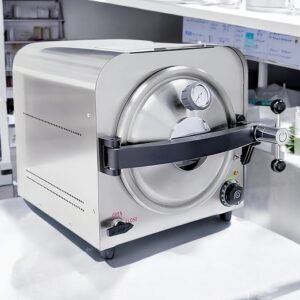Get Your Hands on the Best Dental Autoclave Options at Toothcarenook
A dental autoclave is vital in ensuring the highest level of sterilization in any dental practice. It completely disinfected instruments, and protected patients and the staff from potential infections. At ToothCareNook, we have advanced autoclaves for quick and reliable sterilization to keep your practice environment safe and hygienic. Our selection at ToothCareNook is designed to match stringent modern dentistry demands that ensure optimum safety every time.
Exploring Dental Autoclaves
Dental autoclaves are equipment used to sterilize instruments and equipment in any dental practice. They eliminate all forms of bacteria, viruses, fungi, and spores from the dental tools by applying high-pressure steam at a high temperature.
Sterilization is important because the instruments used are safe for patients so that infection will not be transmitted from one to the other. Just like the dental pods, an autoclave sterilizer is what forms the basis of a sterile environment in any dental clinic.
Here are a few types of dental autoclaves for sale for you.
Types of Autoclaves for Your Dental Clinic
At toothcarenook, we have the following autoclaves for dental clinic.
Gravity Displacement
These types of autoclave sterilizers are the most common and reliable for any dental clinic. Steam is introduced into the sterilization chamber, while air is forced out through a vent. As steam fills the chamber, pressure and temperature rise to a point that kills every living organism on the dental instruments. Gravity displacement autoclaves like the BONEW Steam autoclave are relatively easy to use, inexpensive, and appropriate for sterilizing dental tools.
Pre-Vacuum (High-Speed)
The pre-vacuum is designed for a faster, more complete process to autoclave dental instruments. This type of autoclave removes the air from the chamber preceding the actual steam infusion to make a much more uniform steam penetration. These autoclaves are more suited to busy dental practices with limited spare time. At an advanced level, safety and efficiency are combined in the thorough processes of sterilization for complex instruments.
Class B Autoclaves
Class B autoclaves represent the most sophisticated and advanced category available for dental clinics. The devices operate by using a combination of pre-vacuum cycles and post-vacuum drying to achieve absolute sterilization of any type of dental instrument, including those of highly complex structures like hollow or porous items. Sterilization under Class B is carried out according to the highest standards. It is suitable for all instruments and materials used in dental procedures. With advanced performance and multi-faceted features, they become a prior choice for clinics that respect their patients’ safety at the highest level.
Portable Options
Portable dental autoclaves like Forwillsky portable sterilizers are compact, lightweight, and mobile for easy transportation to small clinics or independently run mobile dental setups. These devices achieve adequate sterilization by disinfecting the dental tools or instruments with steam. These units are designed keeping maximum convenience in mind, with fast cycle times and simplistic operation to get your tools sterile and ready wherever you are. Portable autoclaves can offer a convenient way to maintain hygiene standards in many contexts.
The Role of These Autoclave Sterilizers in Infection Control
Autoclave sterilizers are of core value to infection control in dental practices. The autoclaves use high-pressure steam at elevated temperatures to raise the temperature that kills bacteria, viruses, or any other pathogen on dental instruments.
This rigorous process to autoclave dental instruments assures that all instruments are free of harmful microorganisms and reduces the risk of cross-contamination and infections. These sterilizers are used frequently to ensure a safe and hygienic environment for the patient and dental professionals.
How Our Dental Autoclaves Meet Industry Standards
At ToothCareNook, we design dental autoclaves to meet and go beyond industrial standards of safety and efficiency. Each unit is engineered for accurate temperature and pressure control to ensure that instruments in dentistry are thoroughly sterilized.
Our autoclaves are manufactured to stringent specifications set forth by dental regulatory bodies, which include the ANSI and ISO standards, hence ensuring reliability and performance. They are equipped with advanced features like auto drying cycles and brilliantly bright, easy-to-read digital displays, Our autoclave sterilizers provide convenience without ever compromising on infection control.
Tips for Maintaining Your Dental Sterilization Equipment for Longevity
Here are some tips for maintaining your dental sterilization equipment:
Routine cleaning: Clean and sterilize equipment at the end of each day to remove wastes or residues, apply cleaning agents appropriately, and follow instructions to prevent product build-up.
Proper Calibration: Calibration requires that your equipment be used correctly and performed in intervals. This way, proper temperature and pressure settings are maintained as key requirements for effective sterilization methods.
Monitor and Replace Components: Regular checkups and replace the parts that look worn out or damaged, such as seals, gaskets, and filters, to avert any form of malfunction that would make the system stop functioning.
Servicing by Technicians: Servicing of the equipment, the servicing of units, as done by well-trained technicians, is highly recommended to make sure it is always in good order and shape to prevent any potential problems from emerging.
Use proper water: Use distilled or deionized water to prevent the formation of mineral deposits that can be harmful to the equipment and are likely to lead to inefficiencies in sterilization.
FAQs
How hot does a dental autoclave get?
The temperature usually reached inside the dental autoclave is from 250°F to 273°F or 121°C to 134°C. Temperatures within these high-temperature ranges would then likely be able to sterilize dental devices or instruments and kill bacteria, viruses, and other microorganisms.
What bacteria do they use for autoclaving dental?
The biological indicator that is used with the autoclaves in dentistry is normally Bacillus stearothermophilus. Because this bacterium belongs to the group of the most heat-resistant organisms, using the spore of such a bacterium helps to ensure that the autoclave reaches and sustains the required temperature, along with other conditions, for the sterilization of instruments.
How to sterilize dental instruments without an autoclave?
Sterilization of dental instruments without an autoclave can be carried out with several other options as follows:
Chemical Sterilization: By putting them in a chemical solution, usually glutaraldehyde or ortho-phthalaldehyde. The instruments are allowed to soak in the chemical solution for the recommended amount of time for disinfection.
Chemical Vapor Sterilization: This system combines chemicals with heat. The instruments are placed in a vapor composed of heated chemicals such as formaldehyde and alcohol under pressure.
Ultraviolet Light Sterilization: UV sterilizers kill microorganisms with ultraviolet light. While quite effective for surface sterilization, it is not appropriate for all kinds of instruments and does not penetrate very deeply.
Boiling: This process involves the boiling of instruments in water for 20-30 minutes to kill some bacteria and viruses. This technique is less effective than autoclaving and is generally not recommended as a means for complete sterilization.
What cannot be sterilized in an autoclave?
Certain things just can’t be sterilized in an autoclave, or the process even damages them:
Heat-Sensitive Materials:
The temperature and pressure conditions can damage items made from plastic, rubber, or other heat-sensitive materials.
Coated Materials:
Materials with coatings, such as some dental instruments that have special surface treatments, will corrode or become useless.
Sensitive Textiles:
Textiles or fabrics with sensitive fibers may not withstand the autoclaving process, but can cause damage.


